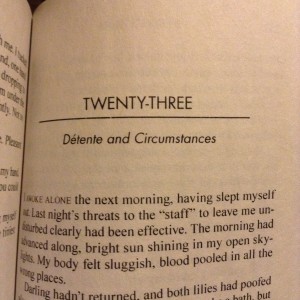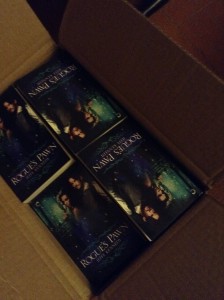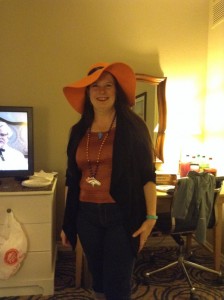RITA ® Award-Winning Author of Fantasy Romance
 I’m over at the Contemporary Romance Cafe talking about why all those profound musings about The Writer’s Life are dirty lies.
I’m over at the Contemporary Romance Cafe talking about why all those profound musings about The Writer’s Life are dirty lies.

 I found out by chance this morning that GOING UNDER released in French today! (I happened to see my name on Twitter in relation to it – Harlequin never tells us these things.) It’s the same title, SEXY GAMES, as the Italian translation. Love this sexy cover, too. Unlike the Italian version, I ought to be able to read this one. I checked the Harlequin Author Network (mainly to make sure this version was legit!) and it looks like UNDER HIS TOUCH will also release in French in May. C’est magnifique!
I found out by chance this morning that GOING UNDER released in French today! (I happened to see my name on Twitter in relation to it – Harlequin never tells us these things.) It’s the same title, SEXY GAMES, as the Italian translation. Love this sexy cover, too. Unlike the Italian version, I ought to be able to read this one. I checked the Harlequin Author Network (mainly to make sure this version was legit!) and it looks like UNDER HIS TOUCH will also release in French in May. C’est magnifique!
Sexy games Tome 1 Elle est son fantasme le plus absolu. Mais, pour la faire sienne, il va devoir découvrir son secret. « Je réaliserai tous tes fantasmes. Mais, d’abord, tu dois apprendre à me faire confiance. » Confiance ? Emily ne se fie à personne ! C’est la seule façon de garantir sa sécurité, et la raison pour laquelle elle a veillé à garder ses distances avec les habitants de la petite île brumeuse de la côte Est où elle a trouvé refuge sous une fausse identité. Pourtant, face à Fox Mullins, son nouveau – et très séduisant – voisin, elle sent un enivrant mélange de peur et d’excitation la gagner. Cet homme éveille en elle un désir primitif. Quelque chose de puissant, de sombre… et de libérateur. Car, elle le devine, si elle s’abandonne à lui, il lui permettra d’oublier – pour quelques heures du moins – le secret qui ne la quitte jamais… A propos de l’auteur :Il y a bien longtemps que Jeffe Kennedy a trouvé sa vocation : l’écriture sous toutes ses formes. Romans, essais, et même poésie, rien ne lui résiste. Mais, depuis quelques années, c’est la romance qui a sa préférence, et plus particulièrement la romance érotique. La recette de son succès ? Deux héros aux personnalités complexes, un amour impossible et un désir irrésistible – le tout saupoudré d’une pincée de BDSM.
Pincée de BDSM? Un désir irrésistible?? Oui, oui, oui!!
 We had some coyote visitors the other day. I took this through our glass front door. They look happy and healthy!
We had some coyote visitors the other day. I took this through our glass front door. They look happy and healthy!
I’m over at Word Whores today, as I am every Sunday, giving the five things I do to boost my creativity.

 I got a surprise box in the mail the other day of ROGUE’S PAWN in print! Harlequin decided to resurrect this, my first fantasy romance and my first novel, and send print copies via their Direct-to-Consumer subscription program. I don’t think it will be up for general sale in print (ebooks are available, though), but I do have all of these lovely copies! If you’d like one, just drop me a note with your physical mailing address.
I got a surprise box in the mail the other day of ROGUE’S PAWN in print! Harlequin decided to resurrect this, my first fantasy romance and my first novel, and send print copies via their Direct-to-Consumer subscription program. I don’t think it will be up for general sale in print (ebooks are available, though), but I do have all of these lovely copies! If you’d like one, just drop me a note with your physical mailing address.
The Covenant of Thorns trilogy, not incidentally, is super fun because of the chapter titles, like the one above. They’re all some kind of joke, even if they amuse only myself.
In other news, I put up my first Patreon posts! I’ve got a public post up on overtraining syndrome for writers on my Patreon for Writers. I also have a special treat only for patrons on my Patreon for Readers. It’s a from Rayfe’s point of view, where he first learns about the betrothal, years before the beginning of The Mark of the Tala. Aside from being read aloud at the Coastal Magic Convention, no one else has seen it. A little exclusive content for my wonderful patrons! A special exclusive Thing is coming up next week just for writers on their Patreon page.
Have a great weekend, everyone!
 I’m over at Savvy Authors, talking about character transformation – including the course I’m teaching for them in March, Sex as a Tool for Character Transformation – and what it means that I was decked out in Broncos gear for the Super Bowl.
I’m over at Savvy Authors, talking about character transformation – including the course I’m teaching for them in March, Sex as a Tool for Character Transformation – and what it means that I was decked out in Broncos gear for the Super Bowl.

I took this pic several weeks ago – just love how the Santa Fe light works, with the highlights and shadows, and the looming mauve fog bank swirling in to shroud it again.
This week’s topic in the bordello is The Joy and Agony of Coming Up With Titles. Come on over to check it out!
 Good news for you audiophiles out there! Birdwoman is now available on audio. Narrated by yours truly. Eep. Let me know what you think, if you pick it up!
Good news for you audiophiles out there! Birdwoman is now available on audio. Narrated by yours truly. Eep. Let me know what you think, if you pick it up!
Also, I’m over at Here Be Magic today, contributing to our Romantic Moments Week with a sneak peek of a scene from THE PAGES OF THE MIND.
Finally, thanks to you wonderful people who’ve already sponsored me on Patreon! Every time I see a new patron, I get a warm fuzzy feeling. You all are awesome! If you haven’t checked them out yet and would like to, I have two: one for writers and one for readers. I’m going to do my first post for writers soon. Really excited to see how this goes!
Have a great weekend everyone!
 Did I show you all one of my very favorite Christmas presents? Yes, I’m easy to please. And I love, love, love my ceramic red 2015 Starbucks mug. It makes me happy every time I use it. David even suggested my coffee ritual for my discussion Sunday on Word Whores on a vice that helps my writing.
Did I show you all one of my very favorite Christmas presents? Yes, I’m easy to please. And I love, love, love my ceramic red 2015 Starbucks mug. It makes me happy every time I use it. David even suggested my coffee ritual for my discussion Sunday on Word Whores on a vice that helps my writing.
Coffee, however, is a vital nutrient, not a vice.
The other day as I was running, a song I’ve long loved came up in the rotation. Are You Out There? by Dar Williams from her End of the Summer album. Here it is, if you care to listen.
At any rate, the lyrics struck me hard when she says:
Are you out there, can you hear this?
Jimmy Olson, Johnny Memphis,
I was out here listening all the time
And though the static walls surround me
You were out there and you found me
I was out here listening all the time
She’s referring to DJs on radio stations she listened to as a teenager. She talks about them some here, though I think the live version isn’t as strong as the studio one. I found myself wanting to reach out and talk to her about this song. I’ve often felt this way about singer/songwriters like her, that I’ve been out here listening all the time. I wonder if she ever got to meet or talk to those guys in person, to tell them that, like I’d love to talk to her.
Maybe what we mostly do is write these things down and send them out into the world, and hope that someone’s listening.
Speaking of hope and making contact, I’m taking a bold new step. (Well, it feels bold to me!) I’ve started a Patreon. Two of them, actually.
What is it? It’s a website interface that allows people to support creators of all types. You can look at the overall here. Basically the way it works is that we can pledge a certain amount of money – $1, $2, $3, etc – that we pay every time an artist produces a “Thing,” whatever their thing may be. In my case, I’m offering two kinds of Things – stories for readers and focused mentoring for writers.
This will be a terrific venue for us all, I hope. For me to reach out to you for help, and for me to give you, my most passionate and loyal advocates what you want most from me.
Ever since I left the Day Job – or, as a friend puts it, since the day job left me – I’ve been piecing together ways to try to make it writing full time. One of the greatest challenges is the lack of steady income. I get pulses of income, but nothing like the steady salary I once had. Also, I have new expenses like paying for my own health insurance. We’re adapting, but the more sources of reliable income, the less scary things are.
This is where the Patreon comes in. Every time I produce a story via Patreon, I can be assured of a certain amount of income in return. Every time I produce a writing lesson or provide assistance via Patreon, I’ll know I’ll get money to pay the utility bills. In return, you all get access to exclusive stories and conversations with me that it would be difficult to get to you any other way.
Also, I really appreciate all the offers of help and support – this is a way for me to accept that. Asking for help can be a scary thing and not something I’ve ever been particularly good at. I’m working on it.
Are you out there, can you hear this?
Indeed.
Thanks everyone – it’s so wonderful to know that you ARE out there!